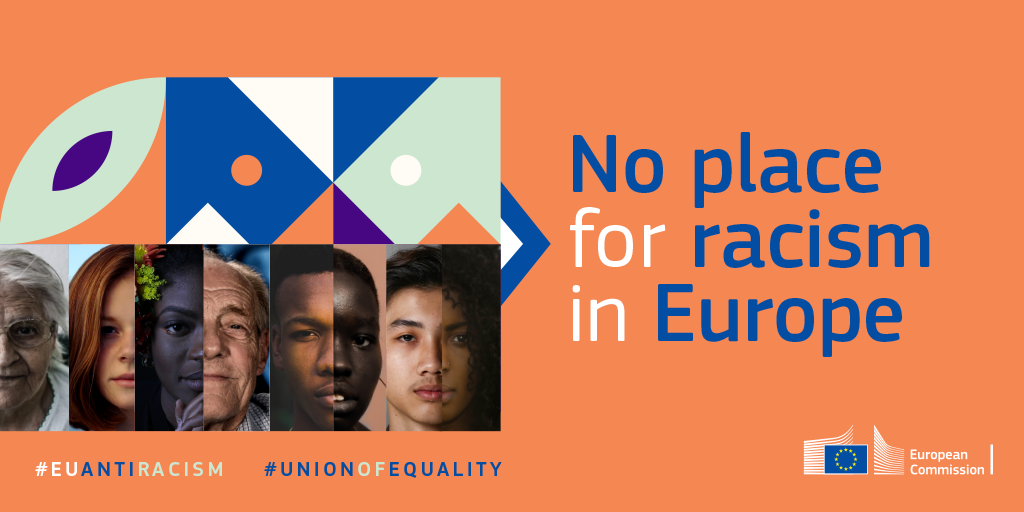EU Policy Corner - 3 questions to the Commission coordinator for anti-racism

date: 13/04/2023
The murder of George Floyd in 2020 in the U.S. at the hands of law enforcement triggered the Black Lives Matter movement that very fast developed into a global human rights movement, which also reached Europe. It was these events that made the EU to step up its work to fight racism in the European Union and led to the European Commission adopting the first EU anti-racism action plan in September 2020. This action plan sets out series of ambitious policy measures until 2025. Among other initiatives, the action plan foresaw appointing of an anti-racism coordinator to bring these ambitious plans to life and to liaise with people from minority groups.
What is the role of the EC anti-racism coordinator? What is the goal to reach by the end of your term?
The Anti-racism coordinator ensures the implementation of the anti-racism action plan. I liaising closely with civil society organisations to relay the concerns of people from racialised communities to the Commission. I also interact with Member States to ensure they adopt national action plans against racism and the European Parliament and academia to strengthen policy responses in the field of antiracism. Finally, I have joined forces with other Commission services to implement the Commission's policy on preventing and combating racism.
My hope is that by the end of my term we have been able to effectively implement the action plan to where it has created change on the ground and bettered peoples lives.
I hope that there will have been a shift in recognizing the importance of mainstreaming anti-racism in all policy making. On a Member State level my hope they will have adopted national action plans against racism and combating racism is seen as a priority issue. With civil society, I hope that we have been able to build a constructive, permanent mechanism that continues to support and inform the Commissions anti-racism work. Furthermore I hope the historical roots of racism have been better addressed an acknowledged. Colonialism, slavery and the Holocaust are embedded in our history and have profound consequences for society today and has led to structural racism. I also hope that the EU anti-racism policy framework will be looked at as a benchmark for comprehensive, horizontal and intersectional anti-racism policy making.
The action plan recognises the concept of structural racism, which perpetuates the barriers placed in the way of citizens solely due to their racial or ethnic origin. Every day, people affected by racism can feel its impact on their access to jobs, healthcare, housing, financing or education. How does the EU plan to fight against this form of racism that exists in the social, economic, educational and political systems in society?
A common misconception about racism is that it is based solely on individual acts. This is because racist incidents and behaviours are the most easily recognizable form of racism. However, structural racism is the most dangerous type of racism, due to the silent mechanism in which it operates. The cumulative effects of structural racism and inequalities and discriminatory practices weaken equality of opportunity and leads to poorer outcomes for people solely based on their racial or ethnic origin.
To address the structural roots of racism and discrimination a comprehensive system of protection against discrimination requires first and foremost the effective enforcement of the existing legal framework, to ensure that individual rights and obligations are respected in practice. It also means ensuring that there are no gaps in this protection.
The Commission has undertaken a comprehensive assessment of the existing legal framework to determine how to improve implementation, whether it remains fit for purpose, and whether there are gaps to be filled.
As we underline in the anti-racism action plan, reliable and comparable equality data are crucial to understand the reality of people suffering from discrimination all over the EU, to assess their needs and address them effectively.
Equality data is central in making the often seemingly hidden phenomenon of structural racism and discrimination into a more concrete issue that effects people lives in access to equal opportunities. Disaggregating data helps in identifying the specificities of an established problem and helps uncover trends and patterns leading to negative outcomes for people from racial or ethnic minority backgrounds.
There is still a lack of comparable and regular data collection on equality and non-discrimination. This prevents us from reaching out to the most vulnerable in our society.
We all need to work together for a common goal – to have more diverse, inclusive workplaces that promote equity . How do you see the role of employers in reducing racism in the workplace? Do you have any recommendations to the organisations wishing to make a difference – where to start?
An inclusive and antiracist workplace is a workplace where all employees feel respected and included. There are studies that show that diverse and inclusive workplaces create a more innovative and productive environment, as everyone will feel like their ideas matter and are well-heard, no matter the persons background. Employers play an important role in achieving a diverse, inclusive and anti-racist workplace.
However, it takes commitment and is often a long term process. Polices &protocols must be reviewed through an antiracist lens. People experiencing racism and discrimination must at the centre of the conversations. Some recommendations are
- Commitment of management as this is key to a successful process
- Prioritising diversity, inclusion and anti-racism at work
- Removing barriers to career success that are in in the way of underrepresented people
- Creating a culture that encourages all employees to show up fully as yourself
- Educate yourself as an organisation on racism, discrimination, privilege, microaggressions, tokenism and allyship etc.
To learn more on the EU Anti-racism Action Plan 2020-2025

